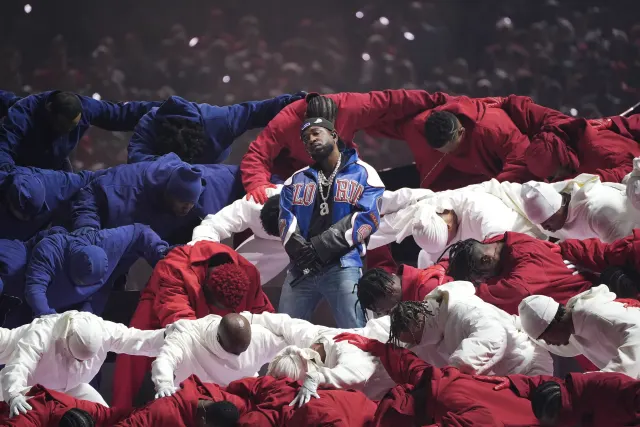(ThyBlackMan.com) Kendrick Lamar’s latest feat is nothing short of historic. His culture-defining hit, “Not Like Us,” has once again ascended to the top of Billboard’s Hot R&B/Hip-Hop Songs chart, making it the longest-leading No. 1 in the chart’s history with an astonishing 22-week reign. This achievement breaks the previous record held by SZA’s “Kill Bill,” which dominated for 21 weeks in 2022-23. What makes Lamar’s resurgence particularly striking is that “Not Like Us” isn’t just continuing a steady climb—it has re-entered the chart directly at No. 1 following his electrifying Super Bowl LIX halftime performance and a triumphant night at the Grammy Awards, where he secured five wins, including Record and Song of the Year.

Lamar’s return to the pinnacle was fueled by a perfect storm of cultural and commercial dominance. The track amassed 49 million official U.S. streams, reaching a new height of engagement, with a 156% surge in plays compared to the prior week. Radio airplay soared to 20.5 million in audience impressions, reflecting a 31% increase, while digital sales skyrocketed by a staggering 432%, translating to 33,000 downloads. These numbers aren’t just statistics—they represent a seismic moment in the genre, a reaffirmation of Lamar’s artistic influence, and an undeniable declaration of his staying power in the streaming era.
For context, “Not Like Us” originally debuted in May of last year and maintained a strong presence on the charts until November. Its return at No. 1 makes it the first song ever to re-enter the Hot R&B/Hip-Hop Songs chart at the summit. Previously, the highest-charting comeback belonged to Juice WRLD’s “Lucid Dreams,” which returned at No. 3 in December 2019 following the rapper’s untimely passing. The fact that Lamar has achieved such a feat without a tragic catalyst, but rather through pure musical impact and cultural relevance, speaks volumes about his reach and resonance.
This historic milestone places “Not Like Us” among an elite group of long-standing No. 1 hits in the Hot R&B/Hip-Hop Songs chart’s history, surpassing some of the most recognizable anthems in modern music. Lil Nas X’s “Old Town Road,” a track that seemed unstoppable in 2019, held its ground for 20 weeks, while Drake’s “One Dance” and Lil Nas X’s “Industry Baby” both led for 18 weeks. Further down the list, Robin Thicke’s “Blurred Lines” held for 16 weeks in 2013, and Mary J. Blige’s “Be Without You” commanded the chart for 15 weeks back in 2006. Jack Harlow’s “Lovin on Me,” a recent hit, also tied that 15-week mark.
Beyond its dominance on the Hot R&B/Hip-Hop Songs chart, “Not Like Us” also made a remarkable resurgence on other major Billboard rankings. It reclaimed the No. 1 spot on the Hot Rap Songs chart for a record-extending 26th week and made an unprecedented leap from No. 15 to No. 1 on the Billboard Hot 100, marking its third week leading the all-genre chart. The scale of this resurgence underscores the track’s staying power and its ability to capture the collective consciousness of music listeners worldwide.
What sets “Not Like Us” apart from many chart-toppers is its ability to function as both a mainstream hit and a deeply personal artistic statement. The track embodies the signature storytelling and sharp social commentary that have defined Lamar’s career, weaving intricate narratives that reflect the realities of contemporary life. His ability to balance introspection with wide-scale appeal is what makes him not just a rapper, but a cultural architect.
Lamar’s influence extends beyond just this one song. This week, he has an astonishing 19 songs charting on the 50-position Hot R&B/Hip-Hop Songs chart, completely dominating the space. In an unprecedented move, he occupies the entire top six, a testament to the depth of his catalog and the continued relevance of his music. Close behind “Not Like Us” at No. 1 are his recent chart-toppers: “Luther” featuring SZA, “TV Off” with Lefty Gunplay, and “Squabble Up,” taking the No. 2-4 spots, respectively. The halftime show setlist clearly reinvigorated interest in these tracks, leading to spikes in all three major tracking metrics—streaming, radio airplay, and sales.
Even Lamar’s collaborations are experiencing a resurgence. His SZA-assisted single “30 for 30” climbed from No. 6 to No. 5, despite not being included in the Super Bowl performance. As a current single, its radio presence continues to grow, benefiting from the overall uplift in interest surrounding Lamar’s work. Another throwback collaboration with SZA, 2018’s “All the Stars,” also saw a revival, re-entering at No. 6 due to its inclusion in the halftime set. The impact of these tracks surging at once further solidifies Lamar’s grip on the genre and his ability to shape the musical conversation long after an album’s initial release.
Speaking of albums, Lamar’s latest full-length project, GNX, has seen a meteoric rise alongside his singles. The album, which debuted last November, has now returned to No. 1 on the Top R&B/Hip-Hop Albums chart for a fifth non-consecutive week, fueled by a 264% increase in equivalent album units to 236,000 for the week. This resurgence is not confined to the hip-hop sphere alone—GNX also catapulted from No. 4 to No. 1 on the all-genre Billboard 200, marking its first time reclaiming the top spot since its initial release.
The numbers alone make a compelling case for Lamar’s dominance, but it’s the broader cultural implications that solidify his legacy. “Not Like Us” has become more than just a hit—it’s a defining moment in contemporary music, a track that has transcended typical chart cycles and cemented itself as a generational anthem. Few artists have the ability to shape the soundscape of a genre the way Lamar does, and fewer still can sustain such relevance across multiple eras of hip-hop.
As we witness the continued success of “Not Like Us” and the ripple effects throughout Lamar’s catalog, it becomes evident that his influence is as strong as ever. The record-breaking 22-week reign isn’t just a testament to his artistry, but a reflection of a listening public that still craves the depth, complexity, and authenticity that Lamar brings to his craft. In an era where musical trends shift rapidly, Kendrick Lamar has once again proven that substance, when executed with precision, will always have a place at the top.
Staff Writer; Jamar Jackson

















Leave a Reply